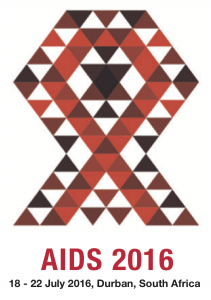Reports from AIDS 2016 and linked workshops
29 July 2016. Related: News.
 The 21st International AIDS Conference (AIDS 2016) was held from 18 – 22 July 2016 in the coastal town of Durban in South Africa.
The 21st International AIDS Conference (AIDS 2016) was held from 18 – 22 July 2016 in the coastal town of Durban in South Africa.
Attended by more than 18,000 delegates, this vital meeting covers all aspects of HIV research: from early basic science studies looking at mechanisms for a cure to real world practice for ensuring human rights are respected for the 35 million people living with HIV globally.
Historically, this meeting is significant for returning to Durban, sixteen years after the World AIDS Conference was first held in an African country.
Over this time, remarkable advances have been made in global healthcare but a continued theme for the meeting was that this work is still only half completed. Although more than 17 million people now access HIV treatment (ART) globally, universal access is increasingly raised as the most appropriate target if the HIV epidemic is to ever be reduced.
Several important workshops were held before the main conference, including meetings focused on paediatrics, TB confection and HIV cure.
This page will link to early reports for HIV Treatment Bulletin (HTB) and HTB South.
AIDS 2016
- AIDS 2016: online access to conference programme
- PrEP studies at AIDS 2016
- No HIV transmissions in PARTNER study: most widely reported i-Base article
- ZERO: no linked HIV transmissions in PARTNER study after couples had sex 58,000 times without condoms
- Q&A on the PARTNER study: how to interpret the zero transmission results
- PROMISE results support WHO recommendations for pregnant and breastfeeding women: more needs to be done to improve ART acceptability and adherence
- Dolutegravir is superior to boosted atazanavir in women in the ARIA study
- Dual therapy with dolutegravir + 3TC keep viral load undetectable: 48 week results from PADDLE study
- Once-daily raltegravir at last available: week 48 results from ONCEMRK study
- Dual long-acting cabotegravir plus rilpivirine injections: 48-week results from LATTE-2
- Sub-Saharan African countries moving quickly to recommend “Treat All”
- Efavirenz associated with suicide risk in analysis from START study
- CD4:CD8 ratio is more sensitive marker of risk than CD4 counts in analysis from START study
- Treatment in primary HIV infection is significantly more likely to normalise CD4:CD8 ratio
- Selected publications launched at AIDS 2016
- Four day a week ART: sub-optimal drug levels but few virological failures
- Large disparities in costs of antiretrovirals between low- and middle-income countries
- High risk of virological failure and loss to follow up postpartum in South Africa
- Birth weight and preterm delivery outcomes of vertically vs non-vertically infected HIV positive pregnant women
- High death rates among HIV positive women postpartum accessing ARVs
- Higher rates of eye complications in HIV positive people on ART
- Short reports on selected Durban posters
- No increased resistance with once daily dosing of abacavir and 3TC than twice daily dosing in the ARROW trial
- Raltegravir in HIV-exposed neonates
- Virological response without routine viral load monitoring in children: results from the ARROW trial
- Tenofovir-containing ART reduces bone mineral density in breast feeding women: results from IMPAACT P1084s
GLOBAL HIV CLINICAL FORUM: INTEGRASE INHIBITORS, 16 JULY 2016, DURBAN
TB 2016 WORKSHOP
